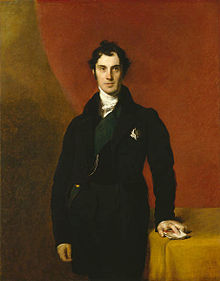George Hamilton-Gordon, 4th earl of Aberdeen
|
The Right Honourable The Earl of Aberdeen KG KT FRSE FRS PC FSA Scot |
|
|---|---|
 |
|
| Prime Minister of the United Kingdom | |
|
In office 19 December 1852 – 30 January 1855 |
|
| Monarch | Victoria |
| Preceded by | The Earl of Derby |
| Succeeded by | The Viscount Palmerston |
| Secretary of State for Foreign Affairs | |
|
In office 2 September 1841 – 6 July 1846 |
|
| Monarch | Victoria |
| Prime Minister | Sir Robert Peel |
| Preceded by | The Viscount Palmerston |
| Succeeded by | The Viscount Palmerston |
|
In office 2 June 1828 – 22 November 1830 |
|
| Monarch | George IV |
| Prime Minister | The Duke of Wellington |
| Preceded by | The Earl of Dudley |
| Succeeded by | The Viscount Palmerston |
| Secretary of State for War and the Colonies | |
|
In office 20 December 1834 – 8 April 1835 |
|
| Monarch | William IV |
| Prime Minister | Sir Robert Peel |
| Preceded by | Thomas Spring Rice |
| Succeeded by | The Lord Glenelg |
| Chancellor of the Duchy of Lancaster | |
|
In office 26 January 1828 – 2 June 1828 |
|
| Monarch | George IV |
| Prime Minister | The Duke of Wellington |
| Preceded by | The Lord Bexley |
| Succeeded by | Charles Arbuthnot |
| Personal details | |
| Born |
George Gordon 28 January 1784 Edinburgh, Midlothian, Scotland, Great Britain |
| Died | 14 December 1860 (aged 76) St James's, Middlesex, England, United Kingdom |
| Political party | Peelite |
| Spouse(s) |
|
| Children | 4 |
| Alma mater | St John's College, Cambridge |
| Religion | Church of England |
| Signature |  |
George Hamilton-Gordon, 4th Earl of Aberdeen, KG, KT, FRSE, FRS, PC, FSA Scot (28 January 1784 – 14 December 1860), styled Lord Haddo from 1791 to 1801, was a British politician, diplomat and landowner, successively a Tory, Conservative and Peelite, who served as Prime Minister from 1852 until 1855 in a coalition between the Whigs and Peelites, with Radical and Irish support. The Aberdeen ministry was filled with powerful and talented politicians, whom Aberdeen was largely unable to control and direct. Despite trying to avoid this happening, it took Britain into the Crimean War, and fell when its conduct became unpopular, after which Aberdeen retired from politics.
Aberdeen's career was dominated by foreign policy, but his experience did not prevent the slide towards the Crimean War. His personal life was marked by the loss of both parents by the time he was eleven, and of his first wife after only seven years of a happy marriage. His daughters died young, and his relations with his sons were difficult. Before his marriage he travelled extensively in Europe, including Greece, and he had a serious interest in the classical civilisations and their archaeology. On his return to Britain in 1805 he devoted much time and energy to improving conditions on his Scottish estates.
After the death of his wife in 1812 he became a diplomat, almost immediately being given the important embassy to Vienna while still in his twenties. His rise in politics was equally rapid and lucky, and "two accidents — Canning's death and Wellington's impulsive acceptance of the Canningite resignations" led to him becoming Foreign Secretary to the Duke of Wellington in 1828 despite "an almost ludicrous lack of official experience"; he had been a minister for less than six months. After holding the position for two years, followed by another cabinet role, by 1841 his experience led to his appointment as Foreign Secretary again under Robert Peel for a longer term. This was despite his being a "notoriously bad speaker", which mattered far less in the House of Lords, and having a "dour, awkward, occasionally sarcastic exterior". Nonetheless his Peelite colleague, later himself Prime Minister, William Ewart Gladstone, said of him that he was "the man in public life of all others whom I have loved. I say emphatically loved. I have loved others, but never like him".
...
Wikipedia
